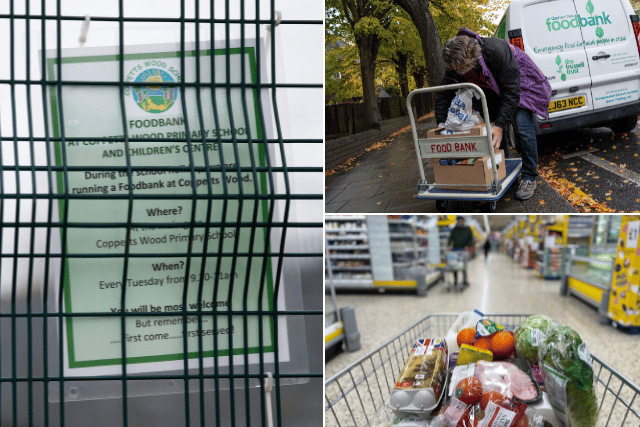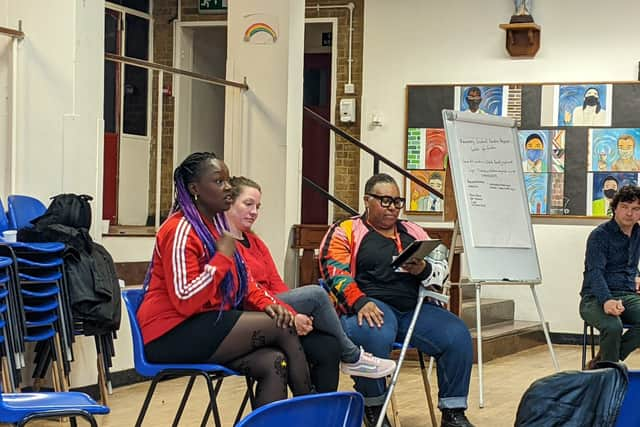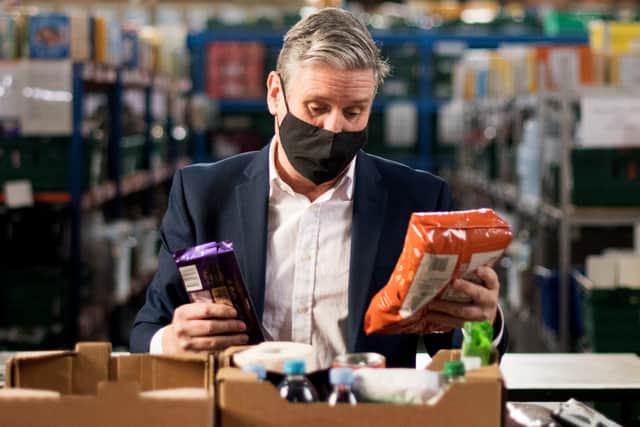Cost of living crisis: London has ‘broken food system’, poverty campaigners warn
and live on Freeview channel 276
London has a “broken food system” and “rising” levels of malnutrition, campaigners battling for fairer access to food and nutrition have warned.
Activists from the right to food movement have spoken out ahead of World Hunger Day (May 28), as the cost of living crisis pushes food prices and energy bills higher.
Advertisement
Hide AdAdvertisement
Hide AdTheir campaign calls on the government to enshrine the right to food into UK law - ensuring everyone has access to adequate and appropriate nutrition under the legal system.
It comes after LondonWorld tracked a rise in food costs of just over 8% in a year, while mayor Sadiq Khan announced a new online cost of living hub, to help Londoners get by.


And a Food Foundation survey found that more than two million adults had gone without food for an entire day in the last month as they could not afford to eat.
Food activist and dietician Sharron Noonan-Gunning, from the group Food Inequalities Rebellion, said Covid-19 had become “a story of people dying in their homes, people suffering from hunger and malnutrition in council estates”.
Advertisement
Hide AdAdvertisement
Hide AdDr Noonan-Gunning, who leads the London Right to Food campaign, said: “We have a broken food system in London - Covid showed that.
“The right to food is enshrined in the United Nations going back to the 1960s.
“Here and now, in a food crisis it means stopping hunger and malnutrition.
“Hunger is a political choice. London is the wealthiest city in the world yet we have hunger and malnutrition - and it’s rising.”


Advertisement
Hide AdAdvertisement
Hide AdShe added: “When the UN rapporteur came over in 2019 he made it clear the reasons why there’s been a massive rise in food insecurity and food poverty and food banks in the UK is because of austerity.
“He tied it to UK government policy.”
The right to food campaign is led nationally by the Labour MP for Liverpool West Derby, Ian Byrne.
But the movement is broken down into city-wide and borough level groups, all aiming to get different tiers of local government to incorporate right to food ideas into their work.
Projects are underway in Brent, Hackney, Haringey, Islington, Lambeth, Lewisham, Southwark, and Tower Hamlets.
Advertisement
Hide AdAdvertisement
Hide AdRyan Hack, a Labour councillor in Brondesbury Park, Brent, is part of the local grassroots campaign in the area.


He describes his ward as “affluent with areas of extreme poverty”.
The group aims to provide people with direct access to healthy food- including via community gardens.
“Donations to foodbanks can be saturated with sugar,” he says
Advertisement
Hide AdAdvertisement
Hide Ad“Brent has one of the highest diabetes rates in the capital.
“We want to promote cash first solutions - and that welfare should be increased in line with inflation.”


He adds: “The welfare system in this country is broken and we’ve been having this debate since the 1960s.
“It seeps out of years of governments failing to address this issue.”
Advertisement
Hide AdAdvertisement
Hide AdAlex Colas, a professor of international relations at Birkbeck, and co-convenor of the Brent campaign, says the group work alongside existing food activists in the borough, from charities like Sufra, to allotments and community gardens, and schools.
“Millions of people are hungry every day or week in the UK,” he said.
“That’s not acceptable. We want food security for everyone - every day.”
He continues: “We have a broken food system with food workers, hospitality workers and Deliveroo riders using food banks.
Advertisement
Hide AdAdvertisement
Hide Ad“That tells you something isn’t right. The cheapness means we aren’t paying people enough.”
Dr Colas also describes food banks as “the worst possible solution” adding: “It’s a sticking plaster - recycling surplus food from supermarkets.
“It can assuage people’s consciences, but not the structural reasons for food poverty.”
A government spokesperson said: “We recognise the pressures on the cost of living and we are doing what we can to help, including spending £22 billion across the next financial year to support people with energy bills and cut fuel duty.
Advertisement
Hide AdAdvertisement
Hide Ad“For the hardest hit, we’re putting an average of £1,000 more per year into the pockets of working families on Universal Credit, have boosted the minimum wage by more than £1,000 a year for full-time workers and our Household Support Fund is there to help with the cost of everyday essentials.
“We have also expanded access to free school meals more than any other government in recent decades and our upcoming Government Food Strategy will pave the way to ensuring a healthier, more sustainable, resilient, and accessible food system that levels up our country.”
Comment Guidelines
National World encourages reader discussion on our stories. User feedback, insights and back-and-forth exchanges add a rich layer of context to reporting. Please review our Community Guidelines before commenting.
